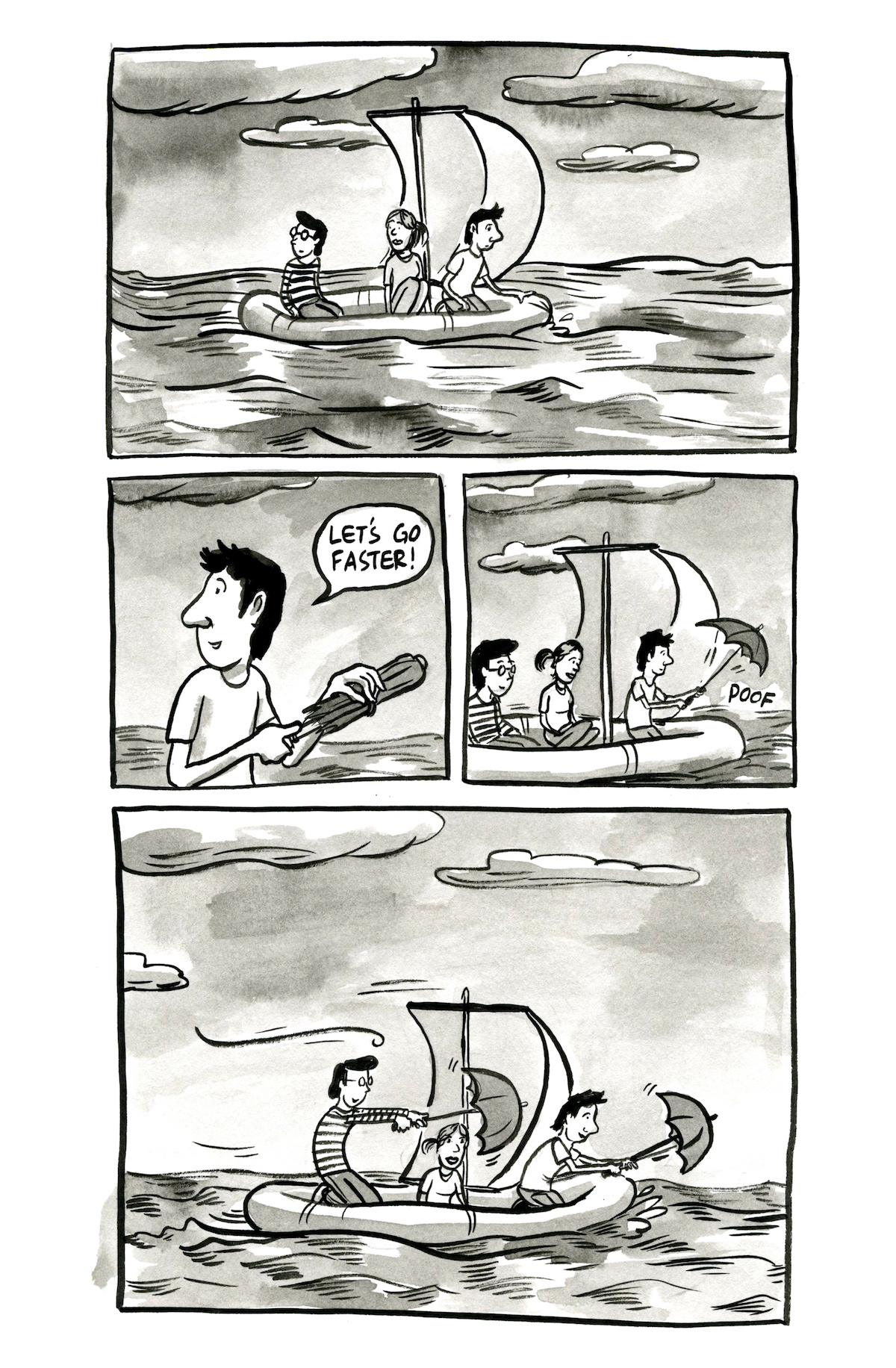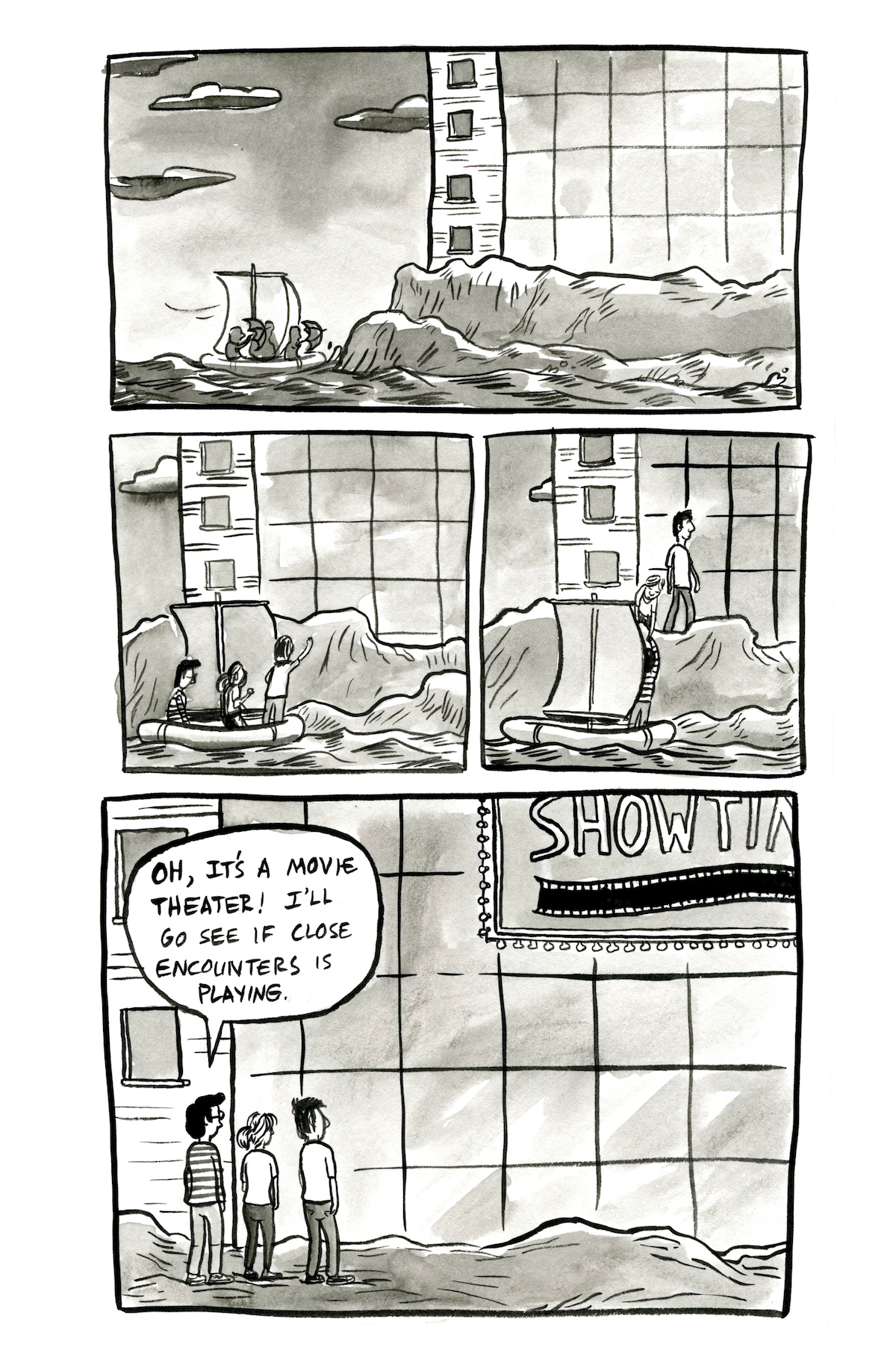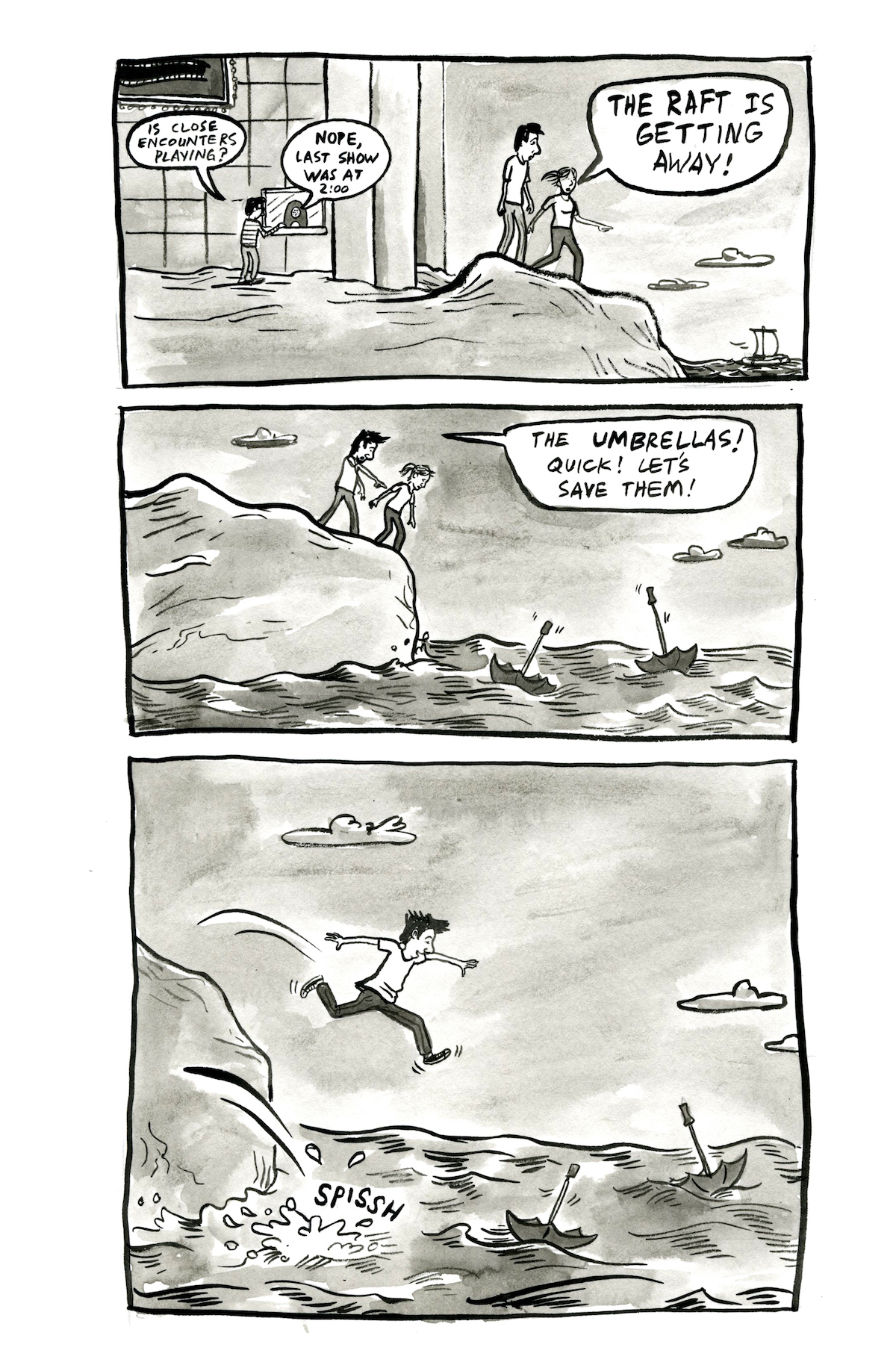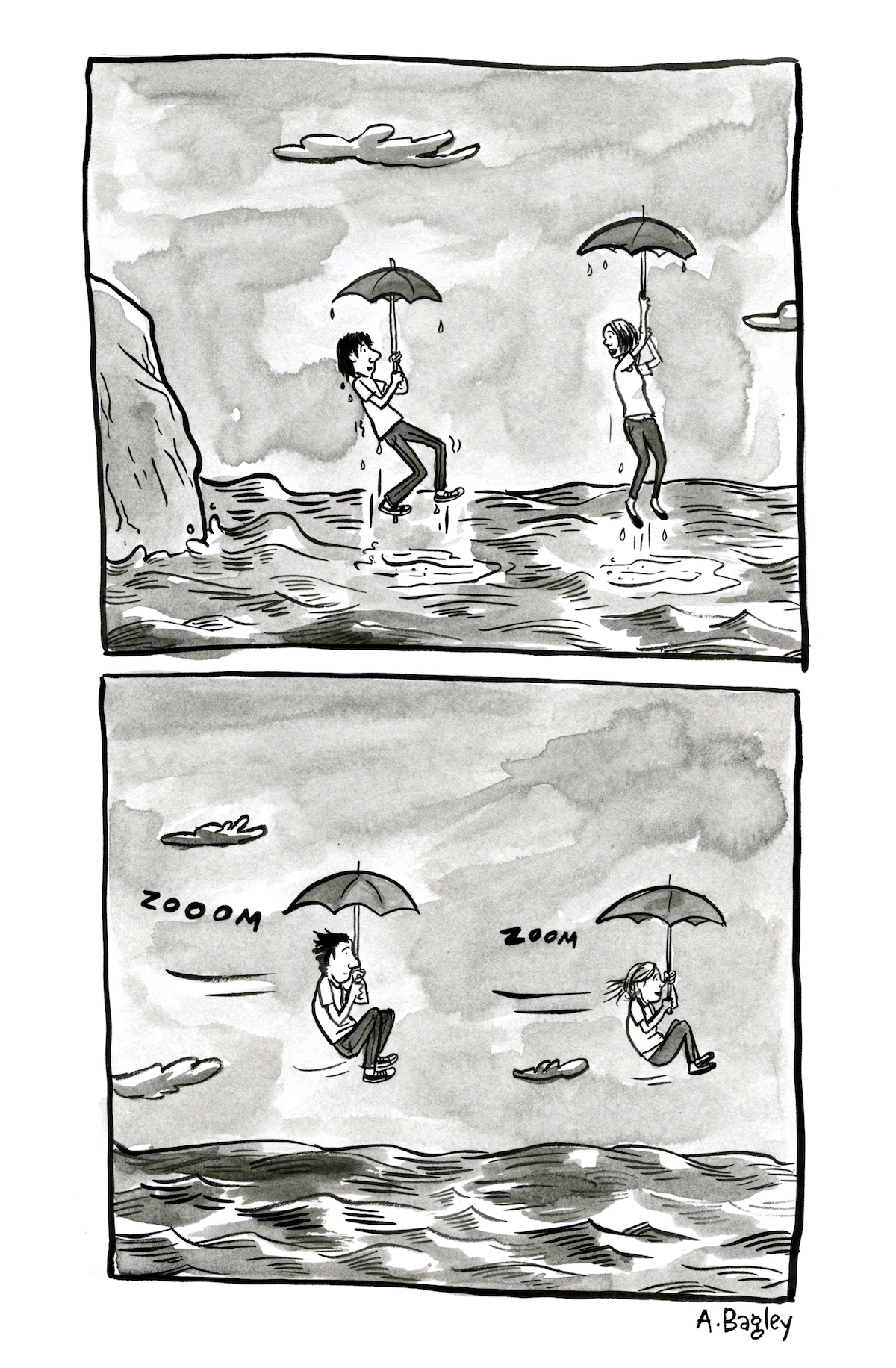Your Week in Readings: The best literary events from April 2nd - April 8th
Monday, April 2: Turn This Book Into a Beehive Reading
This is a reading for a book that explains bees to children. But that's burying the lede. This is "a book that turns into a working beehive to house a colony of friendly, efficient-and non-stinging!-mason bees." Holy fucking shit! Third Place Books Lake Forest Park, 17171 Bothell Way NE, 366-3333, http://thirdplacebooks.com, 7 pm, free.Tuesday, April 3: The Consciousness Instinct Reading
Michael S. Gazzaniga is a neuroscientist. His latest book examines the couple handfuls of goop inside our skulls that somehow manages to simultaneously sit there doing nothing and also deliver us the entire universe with very little effort. PATH Auditorium, 2201 Westlake Avenue, 7:30 pm.Wednesday, April 4: Reading Through It Book Club
The post-Trump book club from the Seattle Review of Books and the Seattle Weekly meets every month to discuss a single aspect of our garbage current events. Sometimes we come away feeling a little more hopeful! Today's selection is Kill All Normies: Online Culture Wars from 4Chan and Tumblr to Trump and the Alt-Right by Angela Nagle. Third Place Books Seward Park, 5041 Wilson Ave S, 474-2200, http://thirdplacebooks.com, 7 pm, free.Thursday, April 5: Rebecca Brown and Nico Vassilakis
See our Event of the Week column for more details. Gallery 1412, 1412 18th Ave, 7 pm, free.Friday, April 6: Songs of Dismantling Reading
According to press materials, Fernando Pérez's debut collection of poems "employs lyric and nonce forms to interrogate identity politics and piece together a complex family history." Here's the thing: even if the book was bad — and it doesn't look like it will be — Pérez is debuting the book with three great local poets. Bojan Louis, Naa Akua, and Jane Wong will help see the book into the world. That alone is good reason to show up. Hugo House, 1021 Columbia St., 322-7030, http://hugohouse.org., 7 pm, free.**Saturday, April 7:
Democracy in Chains Reading** Nancy MacLean, who teaches public policy at Duke University, comes to town with her in-depth exploration of extreme conservatism, Democracy in Chains: The Deep History of the Radical Right's Stealth Plan for America. Greenwood Senior Center, 525 N 85th St, 4 pm, $5.*Sunday, April 8: Writers Read
Local authors read new work and answer your questions about the writing life, and then you get an opportunity to read your own work at an open mic.
Seattle Public Library, Columbia City Branch, 4721 Rainier Ave S, 386-1908, http://spl.org, 2 pm, free.
Literary Event of the Week: Rebecca Brown, Kreg Hasegawa, and Nico Vassilakis
Rebecca Brown, the smartest writer in Seattle, has been out of commission recovering from a broken ankle. But with spring poking its fuzzy little head out of the newly muddy earth, Brown seems eager to get off the couch and out into the world with at least two events this month. This Thursday at Gallery 1412, Brown will be reading new and old work to celebrate her long winter's hibernation and her new spring awakening.
Brown is helping to celebrate two other writers with local ties. Kreg Hasegawa, one of the tech-savviest employees at the Seattle Public Library, is somehow finding the time during the library's website relaunch to launch a new chapbook into the world. (Hasegawa, of course, is a member of the Margin Shift poetry collective, so he knows his poetry.)
Either of these authors alone would be reason to show up for a reading, but they're joining together to celebrate a very special occasion: the triumphant return of Seattle poet Nico Vassilakis. Vassilakis, one of the world's preeminent visual poetry experts, lived here for years before leaving town for New York City a while back. In the time since, he's been hard at work blurring the line between visual art and poetry - between language and symbols and design.
Vassilakis is visiting town to celebrate the release of his newest book, In The Breast Pocket of a Fine Overcast Day Unlike some of his more outrageous visual poetry work, Pocket is a collection of more conventional poems written between 2010 and 2015. These are poems about love and subways and beauty and death and all the subjects that move poets to write.
Vassilakis was for years a pillar of the poetry community, representing at poetry and comics events all around town, and supporting poets as they started out. This brief return - especially with a book of poems that were in part written here - is a special kind of homecoming.
Gallery 1412, 1412 18th Ave, 7 pm, free.
The Sunday Post for April 1, 2018
Each week, the Sunday Post highlights a few articles we enjoyed this week, good for consumption over a cup of coffee (or tea, if that’s your pleasure). Settle in for a while; we saved you a seat. You can also look through the archives.
Ten Times Gravity
Reading this essay by Richard Chiem is like being run over by a very gentle freight train; there’s a vibration on the tracks, then suddenly you’re aflight — slightly stunned, wondering how something that looked far off got so close so fast. He’s talking about confidence, about childhood, about cruelty, about love, and in every paragraph he fixes himself and his reader to a point, then quietly flips it and leaves you both spinning. Hard to excerpt, especially because every paragraph’s so carefully crafted and so very much of its place; just click the link.
I ghost at parties because I’m a ghost inside. You will never know it, but I’m reanimating myself right in front of you, all beneath the surface, because I am too much in my own head. I am thinking what to say, how to say it. I am thinking how much it takes to be in a room. It takes so much to be in a room.
My mother, unfortunately, was a cruel person, and my childhood, unfortunately, was her masterpiece. I am made from mostly water and one hundred thousand beatings. I am made of hyperbole and perhaps one hundred dozen beatings.
Letters: Iris Murdoch
Sometimes you just wake up in an Iris Murdoch mood, you know? Maybe you have time for this conversation between biographer James Atlas and Murdoch, from 1990. Or if you’re nearing the bottom of your coffeecup, try this tiny collection of letters from a young Murdoch to Raymond Queneau, an older and then more successful writer, in which she wields her stunning mastery of language to express all the glorious awkwardness of a literary crush.
If the devil were bargaining with me for my soul, I think what could tempt me most would be the ability to write as well as you. Tho’ when I reflect, in my past encounters with that character he has not lacked other good bargaining points ...
The year in Trump novel pitches
Literary agent Erik Hane reads his slush pile like it’s tea leaves for the state of society.
. . . no matter the state of the world, the truly great manuscripts will always be a small fraction the slush. That’s publishing. But if you want a window into the collective state of our writing lives, it’s not the successes that do the revealing — it’s the far larger, unseen body of attempts, false starts, and misshapen Trump novels that reveals that something inside us has been knocked off its axis.
When the Heavens Stopped Being Perfect
Sometimes it’s better not to see the things we love too closely. Alan Lightman on how we lost the perfection of the stars.
Although the history of science has not awarded Messenger the same laurels as Newton’s Principia or Darwin’s On the Origin of Species, I regard it as one of the most consequential volumes of science ever published. In this little book, Galileo reports what he saw after turning his new telescope toward the heavens: strong evidence that the heavenly bodies are made of ordinary material, like the winter ice at Lute Island. The result caused a revolution in thinking about the separation between heaven and earth, a mind-bending expansion of the territory of the material world, and a sharp challenge to the Absolutes. The materiality of the stars, combined with the law of the conservation of energy, decrees that the stars are doomed to extinction. The stars in the sky, the most striking icons of immortality and permanence, will one day expire and die.
Whatcha Reading, Jennifer Haupt?
Every week we ask an interesting figure what they're digging into. Have ideas who we should reach out to? Let it fly: info@seattlereviewofbooks.com. Want to read more? Check out the archives.
Jennifer Haupt is a Seattle-based journalist, and now, novelist. Her first, In the Shadow of Ten Thousand Hills, comes out tomorrow, April 1st. Join her, in conversation with Jennie Shortridge, for her book release celebration, Friday, April 6th, at 7:00pm at The Elliott Bay Book Company.
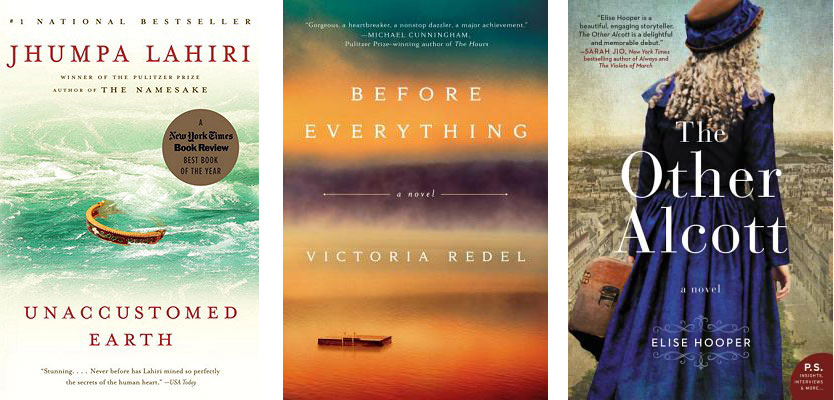
What are you reading now?
I’m obsessed with interesting family relationships, the way we build families and the legacy of dysfunction and passion that is passed from generation to generation. Now I’m reading Jhumpa Lahari’s new collection of linked short stories, Unaccustomed Earth, which is fabulous because it takes readers to different locales, familiar (to me) and far-flung: Seattle, Cambridge, India and Thailand. The stories explore various family relationships and the emotional territory that comes along with that.
What did you read last?
The last novel I read was Before Everything, by Victoria Redel. This is a beautifully written, funny and touching, story about the power of female friendships. The story is wonderful and the structure is engaging. These women are frail and funny, and a kind of extended family.
What are you reading next?
Next up for me is The Other Alcott, by Elise Hooper. I’m a bit late on the uptake for this novel about the real sisters behind the characters in Little Women, which has received excellent reviews. I usually stick to contemporary novels, which is a little weird since much of my novel takes place during the civil rights era in Atlanta and the Rwanda genocide of 1994, but sometimes I do like to dip into other time periods. Now, I’m really wanting to escape into a time when life in our country was simpler.
March's Post-it note art from Instagram
Over on our Instagram page, we're posting a weekly installation from Clare Johnson's Post-it Note Project, a long running daily project. Here's her wrap-up and statement from March's posts.
March's Theme: Sarahs
Life has presented me with many Sarahs; I believe I am not unique in this experience. But I’ve only ever had two main Sarahs — that rare and special Sarah who stays untethered to any modifier (specifying last name, perhaps, or that I mean so-and-so’s Sarah). I’ve been thinking about them. I wrote about one last month — she was my Sarah in college, just for a few years before her death. I find it isn’t tidy, I don’t stop thinking of her just because her death month is over, or a piece of writing is finished. My first Sarah, the surviving one, has a birthday this month. We met in preschool, reconnected in 3rd grade, were mutually ready to commit as friends forever around 8th or 9th (it may have taken a little longer for us to say the words, but I like to think we both knew). She is as different from me emotionally as I could possibly imagine. She is also loyal, thoughtful — somehow knows when I need help, mysteriously can give it in small wordless actions like staying late to do dishes, or coming over to watch a movie, that turn out to mean a world to me in that moment. Every year, starting in high school, we attend the Dina Martina Christmas Show together. As teenagers I think we assumed it was a long-existing tradition for the adults there, but now I see that the show started the same year we first went. Sometime after my divorce, Sarah sent a text thanking me for a ride home after that year’s show. The fact that her spontaneous dating pep talk casually equates my ideal partner with a brilliantly unhinged drag persona (I can’t even describe her, you need to look her up if you don’t know) is perfectly, endlessly charming.
The Help Desk: I wish I hadn't agreed to edit my friend's memoir
Every Friday, Cienna Madrid offers solutions to life’s most vexing literary problems. Do you need a book recommendation to send your worst cousin on her birthday? Is it okay to read erotica on public transit? Cienna can help. Send your questions to advice@seattlereviewofbooks.com.
Dear Cienna,
There’s this couple I’ve been friends with for years. One of them is writing a memoir, which I agreed to edit.
When I got the manuscript, I realized it documents a bunch of stuff I wish I didn’t know — without getting too specific, there are stories in this thing that call their entire relationship into question.
What’s my obligation to both of my friends here? I don’t think I can spend months working through the text and keeping those deep dark secrets to myself. On the other hand, “do I tell the girlfriend” is such a sad, tired story. It’s not really my business, maybe she already knows, and I did say I’d help bring this baby book into the world.
Help!
Carol, International District
Dear Carol,
You sound like the type of well-meaning person who lets crafty Mormon missionaries in your house to use your bathroom, ignorant of the fact that the anus is the gateway to the soul and its sanctuary should be protected at all costs. Or who is annually tricked into donating to the Humane Society by those personalized address labels they send out, ignorant of the fact that the Humane Society is a subsidiary of the Lisa Frank empire and saving furry lives is a front to push tacky office items.
Sweet, trusting Carol. In most instances, memoir has become a pretentious word for "journal." No friend should be forced to read, let alone edit, another friend's journal. (An aside to memoir-writing folks: Do not ask friends to read your manuscript – it is only appropriate to ask friends to read your memoir if/when it is published. In the interim, find a writing group full of aspirational memoirists and you can all take turn making each other's eyes bleed through the editing process. It is only fair.)
But the deed is done and now the mundane horrors contained within are forever stamped on your brain. At this point, your obligation is to yourself and your sanity. Approach your journaling friend and say something like, "Hey, I wish you would've given me a head's up about some of this content, as it's pretty personal and puts me in an awkward position with your partner. Have they read it yet?"
If they have not, tell your friend that you don't feel comfortable editing their journal any further, and point out that if they were truly serious about getting it published, their partner will read it eventually and they should have that talk now. If their partner is aware, suck it up and tell the journaler they owe you a keg for your mental anguish. Then finish editing the damn thing and immediately hang a "No Soliciting" sign on your front door.
Kisses,
Cienna
Mail Call for March 29, 2018
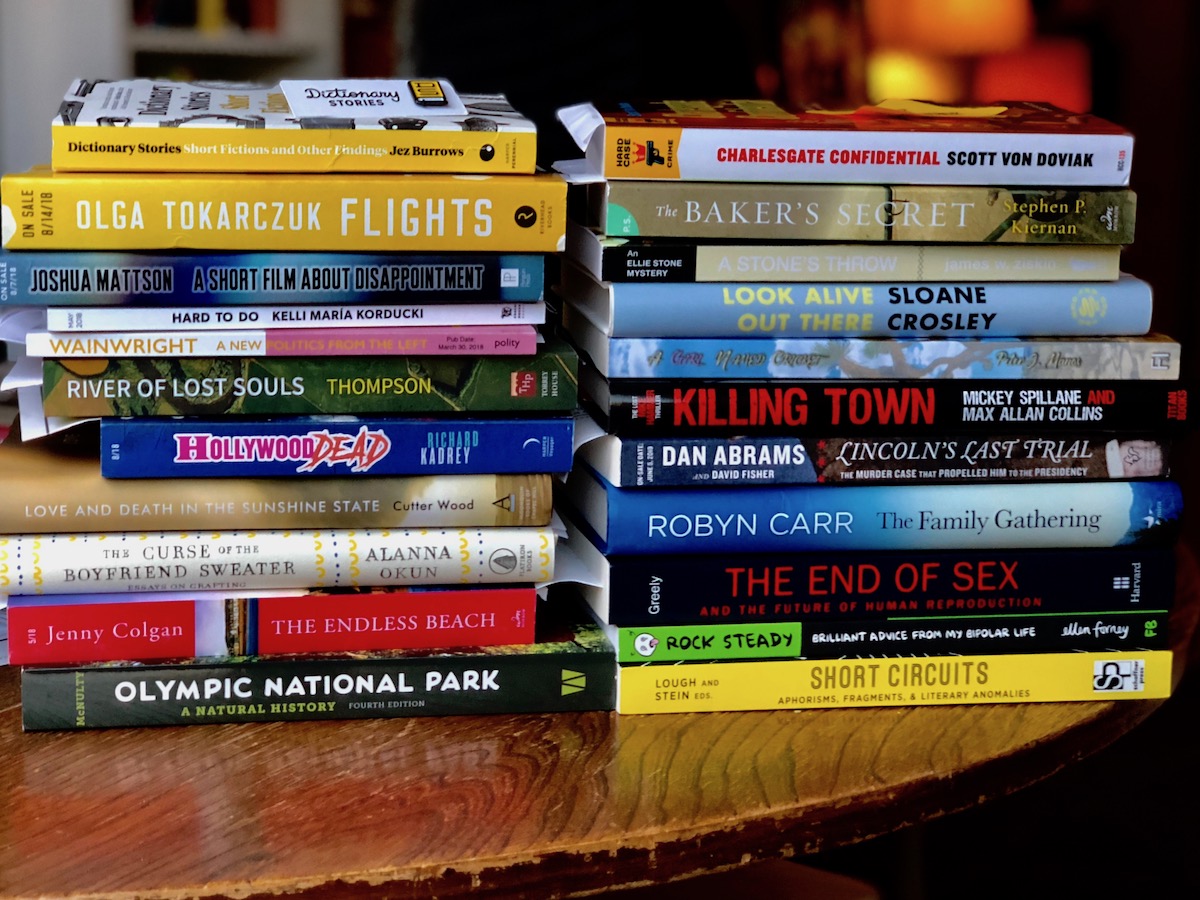

The Seattle Review of Books is currently accepting pitches for reviews. We’d love to hear from you — maybe on one of the books shown here, or another book you’re passionate about. Wondering what and how? Here’s what we’re looking for and how to pitch us.
Portrait Gallery: Charles Johnson
Each week, Christine Marie Larsen creates a new portrait of an author for us. Have any favorites you’d love to see immortalized? Let us know
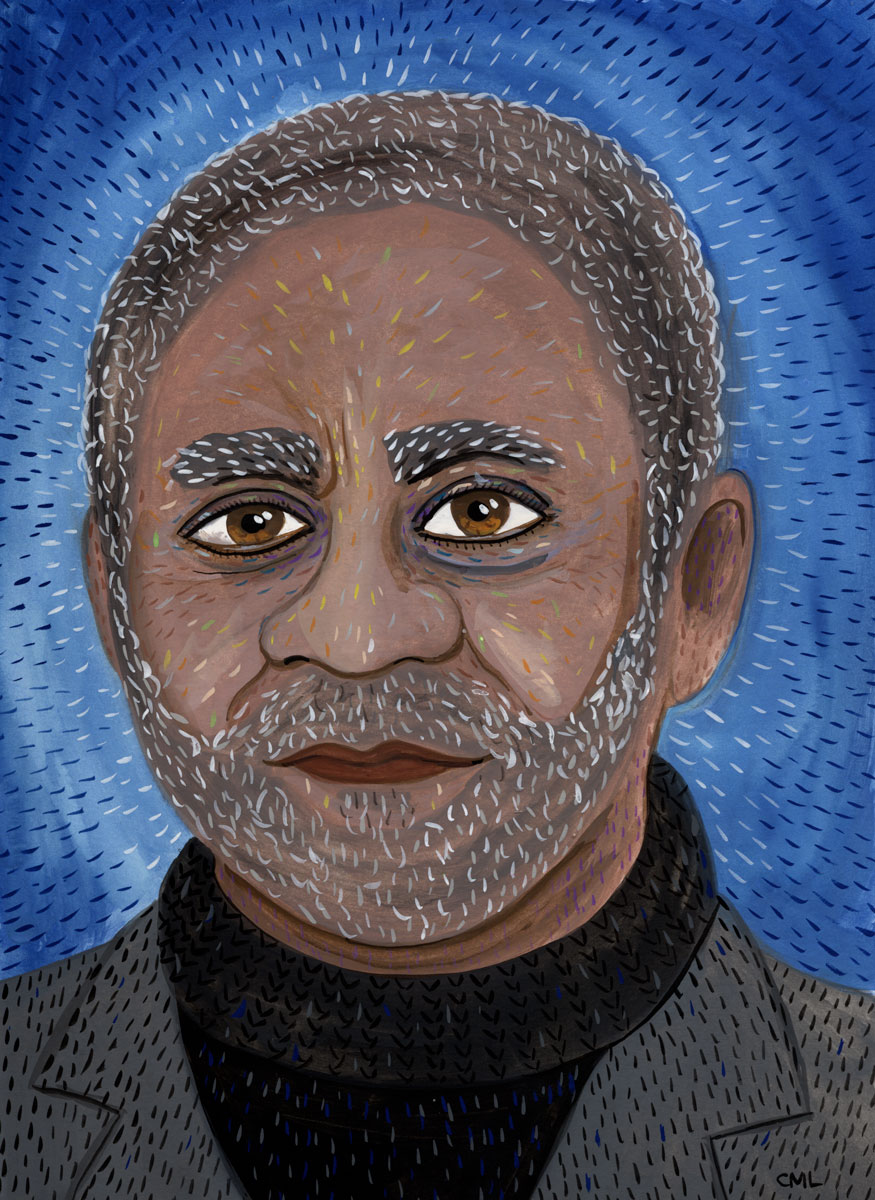
Thursday, March 29th:
Word Works: Charles Johnson
Tonight Hugo House is welcoming Johnson to give a talk about the craft of writing as part of their Word Works series. He’ll be delivering a lecture based on his essay “Storytelling and the Alpha Narrative,” and then he’ll take audience questions on just about any writing-related topics they can imagine. It’s an opportunity to listen to one of our most consequential authors, and to drink in a tiny sip of his oceans of expertise.
Annex Theatre. 1100 E Pike St, http://hugohouse.org, 7 pm, $15
Samantha Cole writes at Motherboard:
In the last few days, word has spread among independent erotica authors on social media that Amazon was quietly changing its policies for erotic novels. Five authors I spoke to, and several more on social media, have reported that their books were stripped of their best seller rankings—essentially hiding them from casual browsing on the site, and separating them from more mainstream, safe-for-work titles.
Coincidentally, serial-fiction app Radish has also just eliminated all erotica from its digital shelves. Nate Hoffelder at the Digital Reader writes:
According to Andrew Shaffer and a number of other people on Twitter, Radish has sent an email to writers who sell stories in the app that is changing its content policy. In order to comply with Apple's content policy for the iTunes app store, Radish is removing all erotica from its app.
You know who still has erotica available for you to buy? Your local independent bookstore.
Thursday Comics Hangover: You belong to The City
Why are fictional cities such a common trope in comics? More than any other art form, comics seem to make it easy to create locations with their own unique spirit. Compare Metropolis in the Superman comics with the Metropolis of any of the Superman movies, for instance, and you'll see how hard it is for film to duplicate the world-building of the comic books. In just a few panels, artists can give Metropolis its own flavor: an art deco city of the future, with flags and golden sunlight everywhere.
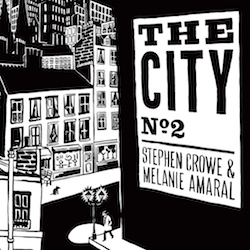
In the second issue of a comic titled The City, Seattle cartoonists Stephen Crowe and Melanie Amaral are hard at work creating a fictional city of their own. Set somewhere in Europe, and sometime between World War I and World War II, the titular city is going through that awkward civilizational phase. It's old enough to have a monarchy, for instance, but modern enough to not know what to do with a king. The first story in The City 2 is about a king returning after a long absence, only to find his grand return foiled by moronic bureaucrats. "The King's coming tomorrow," a border guard tells the king's assistant in front of the king, "We got a memorandum about it. It's going to be a big show. We've got all the bunting in, haven't we?" "Oh, for heaven's sake," moans the king as a second guard shows off a box full of bunting for his arrival. It's a dry and funny story that wouldn't be out of place in a Monty Python sketch.
The City is made up of small vignettes which are related only by theme and setting. (You don't need to have read the first issue at all to enjoy the second issue.) Elsewhere in the city, a pair of academic revolutionaries quibble over the name of their new literary magazine. Elsewhere, some elites are anxious at the prospect of eating ethnic foods. In between the stories are advertisements for a grand hotel ("An impenetrable fortress of privilege in the heart of the city," the ad swoons) and other gorgeous artistic flourishes.
The artwork here is beautiful, recalling the whimsy of Kate Beaton and the elegance of old New Yorker cartoons. The dialogue is appropriately stuffy, with pompous characters setting the stage for their own comeuppance. The biggest complaint I have with The City is relatively small - the lettering in one story at the end of the issue is sloppy and difficult to read. In contrast with the delicate lettering in the rest of the issue, those airy balloons and ugly cursive captions feel more amateurish than everything else.
But fans of literary comedy will be over the moon while reading The City 2. You'll find elements of Kafka and Stefan Zweig throughout. Amaral and Crowe expertly capture that sensation of the time in Europe in between World Wars, when civilization was barely containing the bestial angst just beneath the surface. Sure, people dress in fancy clothes and speak with the utmost politeness, but you expect that at any moment all the finery and shiny medals might disappear in a whirlwind of chaos. There's not much difference between an upright citizen and a cornered animal - just a uniform or a fancy dress is all that's holding us together.
Book News Roundup: Double your donation to Hugo House
Hugo House is very close to moving in to their new home in the old location — the sign is up! — but they still need to raise a little cash before they can settle in. Right now, they've announced that they've got a Challenge Match of $100,000. "That means every dollar donated will be doubled," an email from the House announced. If you haven't given, now is a great time. And if you only have five bucks to spare, you'll actually be donating ten bucks.
Colson Whitehead's AMA on Reddit is full of all kinds of great answers, including his answer to the beloved Reddit question "would you rather fight 50 duck-sized horses or one horse-sized duck?" Whitehead's response to that question, in particular, is the only correct one.
Sean fucking Penn thinks he's a novelist now, and his book includes a poem about #MeToo. Like everything else Sean Penn does, it's gross. I vow to never review this book.
Have you heard of Teen Bo$$ magazine? If not, I'm sorry to do this to you.
This job description is the shocking truth about being a book publicist.
Good headline: "Ursula K. Le Guin‘s Folk/Electronica Album Can Teach Us a Lot About Storytelling."
The Impossibility of Now is a play about love, and language, and falling in love with language
You're on a book review website, so the chances are good that you're occasionally just completely gobsmacked by the beauty of a word. Maybe you've been astounded by the fact that a word like "chair" fits so perfectly with the idea of what a chair is and does. Or maybe you've been suddenly taken with the idea of the word "enormous" - eee-NOR-mous! - to the extent that you force the word into strange new contexts.
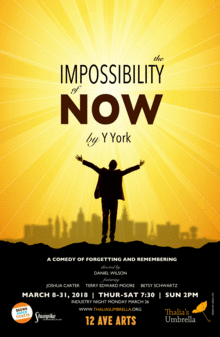
Seattle playwright Y York's The Impossibility of Now (now playing at 12th Ave Arts on Capitol Hill) is all about words: the way they work, they way they don't. The way they delight us and sicken us and confound us and please us.
The premise is straight out of an Oliver Sacks book: a bestselling science writer named Carl (played with infectious exuberance by Terry Edward Moore) suffers a brain injury that renders him amnesiac. Carl's wife Miranda (Betsy Schwartz, quietly stunning in the least flashy role in the play), a poet, learns that Carl has a different relationship with words than he used to. Where once he ghostwrote biographies for astronauts and wrote scathing critiques of anthropologists, now he simply delights in the miracle of words: their sounds, their meanings, the way they look - which he envisions as a flurry of snowflakes drifting through the air.
As Carl wanders around his Las Vegas home, trying to remember his past life, Miranda has to deal with the shambles of their marriage from before Carl's accident. She's having a complicated affair with a dentist named Anthony (Joshua Carter, bringing dignity to a character who could be hopelessly tacky) but suddenly Carl doesn't at all resemble the Carl who made her so miserable. Where before he was withholding and unhappy, now Carl is joyful and content. He's eager to see his wife, and desperate to please her. Is it too late to turn the marriage around? Is it possible to find new meaning in the words they've been using our whole lives?
The Impossibility of Now is put on by local theater company Thalia's Umbrella, and it is an entirely captivating production. Everything from the costumes to the performances to the script is designed with a literary attention to detail. It's funny and touching and endearingly sweet - a thoughtful study of the way different people interact with language, and each other. Even if you're not a regular theater-goer, the book-lover in you will respond to this play on a deep emotional level.
There are three more performances in this run of The Impossibility of Now - this Friday night, Saturday afternoon at 2, and Saturday night. Tickets are still available. Bring someone you love.
The pleasures and pains of housing three Seattle small presses under one roof
It's definitely been more than six months since three Seattle independent presses - Mount Analogue, Cold Cube Press, and Gramma Poetry - took up residence in the XYZ Gallery in Pioneer Square to form a publishing house/bookstore/art gallery. But when I sit down to talk with Mount Analogue founder Colleen Louise Barry, she has trouble figuring out exactly how long the space has been open.
Cold Cube co-founder Aidan Fitzgerald does the math on his fingers. They've been running for eight months. Barry explodes: "Eight months! That both feels correct and incorrect."
What are some of their favorite events that have happened in the space so far? "The BDSM opera actually was a big surprise," Barry says, "because I sort of felt like this is either going to be an enormous failure or people are going to get it. The idea of charging people money for tickets kind of always freaked me out, but people were into it. So maybe we will do more stuff like that."
Fitzgerald reflects on a more recent event. "Colleen and I had a class of students come last week and check out Mount Analogue and the Cold Cube space and that was really, really fun." He enjoyed showing off the Risograph press and the bookmaking process. "We want to do more workshops," Fitzgerald says, "to teach people bookmaking and book design and, you know, why you have to have a title page and why page one starts on the right, and things like that." Additionally, he says, having the room to physically assemble the books is vital: "We're putting out a book a month and we wouldn't be able to do that without this space."
When I ask what the biggest challenge of operating a new space is, Barry doesn't even hesitate a second before blurting out "money." She laughs at her own answer. "Money, and also expectations - everything that you want to happen that maybe you can't make happen, or don't know how to make happen but wish you could. It's all part of having a physical space. It exists and takes up room, and that's a big responsibility."
Fitzgerald feels the responsibility, too. The space, he says, "legitimizes all of our operations and it also raises the bar for what we're doing and how we're doing."
There are some big changes in store for the last third of the first year in the space: Cold Cube and Mount Analogue are teaming up to take over Gramma. What does that mean for the future of the press?
"We're starting a monthly newsletter called The Monthly Gramma, which is a physical newsletter that's Risograph-printed by Cold Cube press," Barry explains. The newsletter is "designed by [Cold Cube co-founder] Michael [Heck], who's our lead designer. It's going to be mailed out, and it will have a bunch of really amazing shit on it." She's not kidding; the beta test of the newsletter is a beautifully printed broadsheet featuring a giant poem broadside on one side and then an array of material - poems, interviews, quotes, trivia, event information - artfully arranged on the other.
Barry says the Weekly Gramma email newsletter is getting an update, too: "we want to transform it into more of a magazine that has a lot of varied content including video work and criticism and poetry and visual work." (You can read an archive of the Weekly Gramma or sign up for the email on the press's website.)
So what's next for the physical space? On April 5th and 12th, Barry is hosting a performance by Jess Joy called "The Singing Mime", which she says is "more akin to modern dance then pantomime - more an expression of narrative through movement." The event includes spoken word and music and dance and a papier-mâché installation that's being built especially for the event.
Cold Cube is hosting its own event during Art Walk on the 5th. They'll be celebrating the publication of Behind Is Late, a book by Spanish artist Cynthia Alfonso. Fitzgerald calls it "a resonant poem-comic about anxiety and the fear of a tomorrow that is constantly happening today." Cold Cube will be showing prints from the book and an animated video project co-produced by Alfonso.
Fitzgerald says Behind Is Late "is one of the most, if not the most, Cold Cube book we've ever made, in that it's kind of a comic, it's kind of one long poem, and the pages themselves stand alone, like beautiful drawings." Fitzgerald says the book is "my conception of what art books and art comics can do. This can only be done in this form. You cannot make it into a movie, you cannot make it a song. It's beautiful because it's a book, which is what Michael [Heck] and I have really tried to make with Cold Cube."
The book, he says, is an "argument for books."
There's a lot more to come from the publishers: they're preparing a blockbuster quarterly reading series in conjunction with a few stalwart Seattle arts organizations that Barry says is intended to "get people in the seats that might not otherwise go to a poetry reading." (If the first lineup comes together as Barry promises, you will be attending this one.) And they're working with Vignettes to put together a citywide art project for May that incorporates public art and words and audience participation.
It's exhausting just hearing about their plans, but Barry and Fitzgerald seem ready to get to work. Sitting there at a large table in the Cold Cube offices, with two large Risograph printers ready to be put to service, they're in exactly the right place to make all their big ideas happen.
Watch the 2018 Prowda Literary Champions Award video
Last week, Seattle Review of Books cofounder Martin McClellan, associate editor Dawn McCarra Bass, and I attended the Seattle Arts and Lectures annual Words Matter fundraising dinner, where this website was honored with the 2018 Prowda Literary Champion Award. We had the privilege of sharing a table with the recipient of the individual 2018 Literary Champion Award, Mary Ann Gwinn.
At the dinner, SAL showed this video, made by the brilliant folks at Golden Lasso:
We're humbled to be mentioned in the same breath with the other Prowda winners. But of course we didn't do any of this on our own. We would like to thank all our columnists and reviewers and poets and artists for joining us on this adventure. (And an extra-special shout out to Cienna Madrid and Christine Marie Larsen for being with us from the very beginning, back when the Seattle Review of Books was just a pile of code on Martin's screen.) We love our sponsors for making the site financially viable for the almost-three years we've been in business.
And of course you, our readers, are the reason we do this. Your passion for Seattle as a world-class city of literature inspires us every day. Thanks for reading and for sharing the site with your friends and for sending us tips and corrections and words of encouragement. We're just getting started, and we're so thrilled to have you along for the ride. Thank you.
Would you rather
Published March 27, 2018, at 11:55am
You put humor in my poetry book! You put poetry in my humor book! Hey, wait a minute...
Waking
late morning (after a long restless
night) blurry eyes focus on the ceiling,
sky in shadows, the clock projects
11:11 neon against the wallan accusation somewhere vague
in my brain, tainted modern
criminal, off-balance, sleeping-in
11:12 is the turn-keyout of bed into the cool room
exit the womb between
blanket and sheet, blasted
with air, light and dust
one must cross through
each day with an agenda
(formed, or not) this critical
movement, one world to the nextwe traverse our time
fractured, come to terms
but the point is to awaken
alive, to drag our self from
the dead of sleep
Join UW Libraries on May 2 for dinner featuring Ted Chiang

But wait: as excited as we think you should be about seeing Chiang, your hosts for dinner deserve equal attention. Every table at the event is shepherded through the meal by a notable Seattle writer or Pacific Northwest writer: Claudia Castro Luna, Ross McMeekin, Ijeoma Oluo, and more. You can see the full list on our sponsorship page. Get your tickets now; they'll go fast.
Sponsors like the University of Washington Libraries make the Seattle Review of Books possible. Did you know you could sponsor us, as well? If you have a book, event, or opportunity you’d like to get in front of our readers, reserve your dates now.
Your Week in Readings: The best literary events from March 26th - April 1st
Monday, March 26: Love Hate Repeat Reading
Set on the University of Washington campus, Love Hate Repeat is a novel about a couple that gets together, breaks up, and gets back together again. They're kind of a clusterfuck but that's kind of the point. University Book Store, 4326 University Way N.E., 634-3400, http://www2.bookstore.washington.edu/, 7 pm, free.Tuesday, March 27: Chain Letter S2E2
The second episode of the second season of the popular new-ish Capitol Hill readings series features authors Taylor Bereiter, C.T. McGaha, Alida Hammond, and the fantastically named Patrick Galactic. Vermillion Art Gallery and Bar, 1508 11th Ave., 709-9797, http://vermillionseattle.com, 7 pm, free.Wednesday, March 28: The House of Broken Angels Reading
Luis Alberto Urrea's latest novel is about a family of immigrants. The story is based on Urrea's own family history, but it gains a certain immediacy in the age of President Trump Seattle Public Library, 1000 4th Ave., 386-4636, http://spl.org, 7 pm, free.Thursday, March 29: The Way of the Writer Reading
See our Event of the Week column for more details. Annex Theatre. 1100 E Pike St, http://hugohouse.org, 7 pm, $15.Friday, March 30: Laura Lippman and David Simon
Laura Lippman has written over 20 works of detective fiction and has won a butt-ton of awards. David Simon created The Wire, which is a TV show that you wanted to hate because nobody could shut up about it but then you watched it and it was really just that brilliant. Tonight, they'll appear together onstage, thanks to Seattle Arts & Lectures. Benaroya Hall, 200 University St., 215-4747, http://lectures.org, 7:30 pm, $20-80.Saturday, March 31: Sorting Room Residency Reading
The most important thing that a writer needs is peace and quiet. Seattle7Writers offers a low-key residency called The Sorting Room, which is a humble room for writers to write in. Tonight, three Sorting Room residents - Matthew Bennett, Janet Buttenwiser and Sierra Nelson - will share work they've written in the room. This event will also raise awareness for Seattle 7 Writers' Pocket Library program, which donates books to "shelters, food banks, correctional facilities, and other places with readers in need of books."Elliott Bay Book Company, 1521 10th Ave, 624-6600, http://elliottbaybook.com, 7 pm, free.

Sunday, April 1: Zeina Hashem Beck, Chelsea Jennings
Lebanese poet Zeina Hashem Beck reads from her second collection, Louder than Hearts. Seattle poet Chelsea Jennings just published her first collection, Transmission Loss this spring. Together, they'll read and talk about what it's like to be published poets.Open Books, 2414 N. 45th St, 633-0811, http://openpoetrybooks.com, 7 pm, free.
Literary Event of the Week: Charles Johnson at the Annex Theatre
Charles Johnson is one of Seattle's literary giants - right up there with authors like Jonathan Raban and Richard Hugo and Denise Levertov. One of Seattle's few National Book Award winners and a MacArthur "Genius," Johnson has represented the city at a time when the nation still considered us to be a literary lightweight.
Johnson's fiction has often been celebrated for the way he has corrected the historical record. His historical novels and short stories have helped provide a voice for Black Americans who have been cut out of the history books. He writes exuberantly, with the passion of someone who knows that he doesn't need to ask permission or forgiveness.
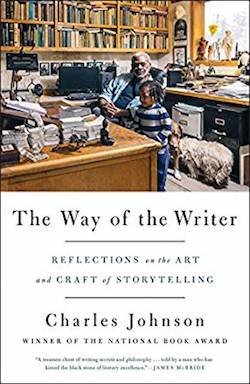
It's no surprise that he excelled as a writing teacher, and that he guided, inspired, and shaped generations of young writers at the University of Washington. Though he's retired from the UW, Johnson confirmed in an interview last year that he's still a teacher. His book The Way of the Writer: Reflections on the Art and Craft of Storytelling offers up some of his most compelling thoughts on the writing craft, but Johnson has a whole world of knowledge inside his head that he's eager to share with new generations of writers.
This Thursday, Hugo House is welcoming Johnson to give a talk about the craft of writing as part of their Word Works series. He'll be delivering a lecture based on his essay "Storytelling and the Alpha Narrative," and then he'll take audience questions on just about any writing-related topics they can imagine. It's an opportunity to listen to one of our most consequential authors, and to drink in a tiny sip of his oceans of expertise.
Annex Theatre. 1100 E Pike St, http://hugohouse.org, 7 pm, $15.
